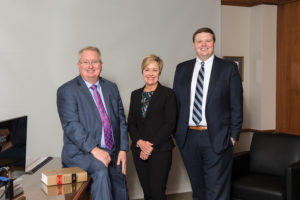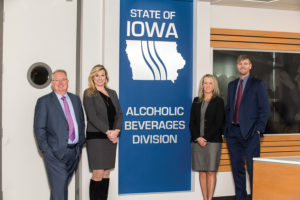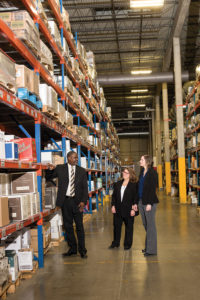Constant improvement: it’s something that’s essential in all business industries, and it’s a core philosophy of the Iowa Alcoholic Beverages Division (ABD). For years, the agency has demonstrated its ongoing ability to identify and implement process improvement strategies across agency operations. Much of these successes can be credited to the leadership provided by Administrator Stephen Larson, who was recently appointed to his third consecutive term by Iowa Governor Kim Reynolds. Looking to the future, it’s clear that the agency has additional improvements in mind, largely in the area of increased governance of the state’s alcoholic beverage marketplace.
Modern rules and regulations
One of the agency’s key focus areas over the next several years is to identify ways in which it can become even more engaged with governing Iowa’s alcohol laws. The Iowa ABD is committed to reviewing and refreshing various laws, processes and policies that affect the alcoholic beverage industry in order to eliminate outdated methods and increase overall licensee compliance across all three regulatory tiers.
“We are evolving more and more as a regulatory agency and need to align with business operations as a control state, but we also need to make sure we have a physical presence out there regulating across the marketplace,” Larson explains.
An overall refresh of the agency’s regulatory program and the revision of trade practice rules are a big part of this overhaul. A detailed strategy kicked off in 2017 with the creation of the Bureau of Regulatory Compliance. This bureau is now working to develop a more level playing field for Iowa licensees through financial audits, inspections and complaint investigations.
 In 2016/17, the Iowa ABD conducted a comprehensive review of Iowa Code Chapter 123, with input from a diverse working group representing state agencies, city and county licensing authorities, local law enforcement, substance abuse prevention specialists, license and permit holders and other stakeholders. Recommended changes aim to create more economic opportunities for local entrepreneurs, make it easier for people to conduct business with state government, clarify Iowa’s alcohol laws to make them easier to understand and enforce and develop public policy that continues protecting the health and safety of Iowans.
In 2016/17, the Iowa ABD conducted a comprehensive review of Iowa Code Chapter 123, with input from a diverse working group representing state agencies, city and county licensing authorities, local law enforcement, substance abuse prevention specialists, license and permit holders and other stakeholders. Recommended changes aim to create more economic opportunities for local entrepreneurs, make it easier for people to conduct business with state government, clarify Iowa’s alcohol laws to make them easier to understand and enforce and develop public policy that continues protecting the health and safety of Iowans.
Another recommendation that stemmed from this effort was to have a further review of Chapter 123 focusing specifically on the licensing, administrative actions and administrative appeals processes—generally speaking, licensing reform. A report on these findings is currently in process, and the Iowa ABD expects to have legislation related to this effort in 2019.
The Iowa ABD is also partnering with local authorities, prevention officials and law enforcement officers to review current licensing processes, eligibility and administrative appeals, in order to determine a better balance of local and state needs and authority. Trade practice rules are in the process of being revised to create regulatory clarity and better synchronize with the evolving industry and marketplace.
Growing the regulatory compliance bureau may also mean an increase in staffing for this area of the agency. Currently, the regulatory team only has four full-time officers dedicated to alcohol investigations, and Iowa ABD leadership hopes that by increasing its regulatory presence, it will be able to add on additional staff positions.
Along with reexamining alcohol laws, the Iowa ABD continues to expand and improve its education and outreach efforts across the state to improve licensee compliance. One of the agency’s most successful programs in this area is the Iowa Program for Alcohol Compliance Training, or I-PACT. The program aims to increase voluntary compliance with Iowa’s alcohol laws through education and enforcement.
During the 2018 fiscal year, more than 21,000 people were trained on the responsible selling and serving of alcoholic beverages through the I-PACT program, which yielded a 96% certification passage rate. The Iowa ABD measures the success of this and other related programs by analyzing compliance statistics; in fiscal year 2018, only 12 people across the state lost their training certification for selling alcohol to minors. In the future, the agency’s goal is for a 100% certification passage rate and zero underage serving compliance issues.
“During the growth stage of the last several years, our compliance area has really grown,” says Josh Happe, Bureau Chief, Regulatory Compliance Bureau with the Iowa ABD. “As our Bureau becomes more established, we’re looking for increased compliance numbers in the coming years.”
 Improved technology and operations
Improved technology and operations
While regulatory issues are always a top priority for the Iowa ABD, the agency is also dedicated to identifying process improvements that meet the growing demands of the alcohol beverage industry and the state’s consumers. For nearly a decade, the agency has experienced healthy revenue growth, generating $320 million in total alcohol sales during the 2018 fiscal year (an increase of 4.7% over the previous year). With $120 million in income from liquor profits, along with funds generated by excise taxes on beer, license fees and fines, the agency contributed more than $138 million to the state’s general fund last year.
In order to maintain its explosive growth, the Iowa ABD identified a series of operational enhancements to improve efficiencies and increase overall productivity. One of the key initiatives involves streamlining the licensing process across the state. The Iowa ABD is working with an external vendor to implement a Salesforce-based licensing system that will connect with other alcohol and tobacco regulatory systems across the agency. According to Larson, a more modernized system is essential for the agency to maintain its optimal performance.
“Ten years ago, when we only had five or six thousand licensees across the state, it wasn’t as big of an issue,” Larson said. “The system we have now is very manual, and we’ve known for some time that we needed to make a change in order to keep up with the growth we’ve been seeing across the state.”
The new system upgrade has been in the planning stages for almost two years. Agency leaders investigated multiple options in order to make the selection that best suited the needs of the Iowa ABD. Staff from across the agency also had an opportunity to give feedback, which was essential because oftentimes they are the people with the most firsthand knowledge of how the current licensing system works, what the challenges are and what the main improvements are that need to be made.
In addition to improving workflow for agency staff, the new system will also serve to improve the licensing experience for applicants and existing licensees.
“It will help people who are not as familiar with how the laws and the licensing processes work by giving them the information in a way that’s easier for them to understand,” Happe says. The initial phase of the new licensing system will roll out during the first part of 2019.
Another big upgrade for the Iowa ABD is the expansion efforts currently underway with its warehouse, which is also partially utilized by the Iowa Lottery. Last updated in 2013, the warehouse was outfitted with a new racking system, but that didn’t result in the addition of any new square footage. Plans are now in place to expand the current building by 20,000 square feet, which will give the agency a grand total of 190,000 square feet of storage space. Additional warehouse space is crucial in order for the agency to keep pace with growing product demand.
 “In the future, we will be able to add new products and help keep more special order items on hand to get them to our customers faster,” explains Herb Sutton, Bureau Chief of the Business Operations Bureau.
“In the future, we will be able to add new products and help keep more special order items on hand to get them to our customers faster,” explains Herb Sutton, Bureau Chief of the Business Operations Bureau.
The cost of this renovation project is estimated between $4 million and $5 million. Construction on the new warehouse expansion is scheduled to begin in spring 2019, with completion anticipated in early 2020.
“Investing substantially in both the warehouse project and the licensing system over the course of the next several years will ultimately allow us to give the state of Iowa a large return on investment over the course of these projects’ lifecycle,” Larson says. “In addition to letting us sell more product, the warehouse is a state-owned facility, and the return will also come by way of the increased value of the property over time.”
More warehouse space is only one aspect of the Iowa ABD’s plans to increase operational efficiencies. The agency recently announced a partnership with Ruan Transportation Management Systems, which will provide warehouse and delivery services as a third-party vendor. The decision to outsource these services was made in response to the agency’s growing need to improve efficiencies and services to its stores. By partnering with an external provider, the Iowa ABD operations team can focus its efforts on category management and product allocation-two areas that are crucial to the agency’s ongoing success.
“Ruan will work with our IT and warehouse management teams to go through our agency protocols. We’ll undergo extensive testing before we move forward,” Sutton says. “We’ll work together with Ruan to develop new processes to make everything run faster and more seamlessly, but the Iowa ABD will still be managing everything from the top down.”
The agency’s goal is to have the Ruan partnership in place and operational by April 2019. The Iowa ABD anticipates that this new arrangement will allow the state to provide better service to its customers, hopefully increasing the current once-a-week delivery schedule in order to get product to retailers and customers as quickly as possible.
Although the Iowa ABD plans to focus on regulatory and business operations issues in the coming year, its core mission remains unchanged: to protect the integrity of the three-tier system along with the overall health, safety and welfare of Iowans.
Melissa Sherwin is a freelance writer and marketing communications strategist from Chicago, IL. Her work has appeared in Chicago’s Daily Herald newspaper, Time Out Chicago, Suburban Life newspapers, and various magazines. She is also the author of several children’s books. Follow her @MelissaNSherwin.










